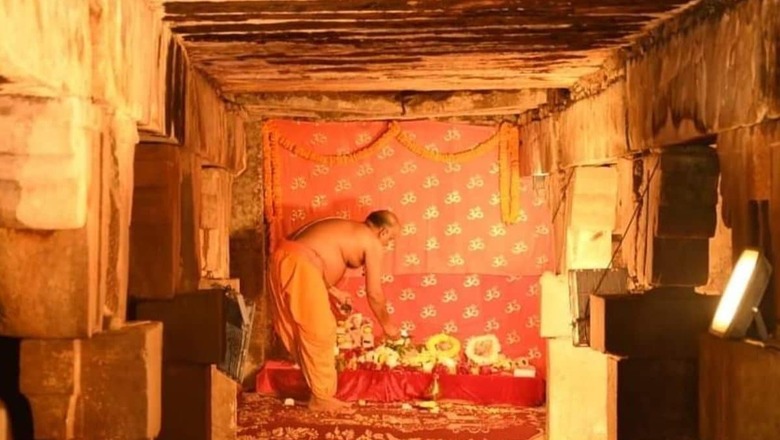
views
Prime Minister Narendra Modi’s parliamentary constituency Varanasi witnessed a historical moment on Thursday when a puja was performed in the southern cellar of the Gyanvapi complex, a day after a local court’s order.
The puja was done for the first time in the Gyanvapi compound after 31 years. The mosque has four ‘Tehkhanas’ or cellars.
On Wednesday, the Varanasi District Judge allowed puja in the cellar on the southern side of the Gyanvapi mosque, directing the authorities to make arrangements for the worship of the idols by plaintiff Shailendra Kumar Pathak Vyas and a priest nominated by Shri Kashi Vishwanath Temple Trust within seven days.
The court’s order came on a petition filed by Shailendra Kumar Pathak Vyas against the Anjuman Intezamia Masjid Committee, which manages the Gyanvapi mosque. According to the lawsuit, priest Somnath Vyas used to perform prayers there till 1993 when the cellar was closed by the authorities. Shailendra Kumar Pathak is the maternal grandson of Somnath Vyas.
“The Hindu side is allowed to offer prayers at ‘Vyas Ji Ka Tehkhana’. The district administration will have to make arrangements within seven days,” said Vishnu Shankar Jain, counsel of Vyas.
During the wee hours of Thursday, the Varanasi District Administration made an elaborate arrangement to ensure the compliance of the court’s order. “I am really grateful to the judiciary for allowing us to offer prayers at the Gyanvapi complex,” said Jitendra Nath Vyas, member of the Vyas family.
Jitendra Nath Vyas said it was more of an “emotional moment” for him as his family was able to offer prayers at the compound after 31 years. “We broke down into tears. It was an emotional moment not only for our family but for all Sanatanis,” said Jitendra Nath Vyas, while performing the puja in the Tehkhana (cellar) of the Gyanvapi mosque around 12.30 am on Thursday.
Jitendra Nath Vyas said the prayers began amidst strict security in the presence of Divisional Commissioner Kaushal Raj Sharma, Police Commissioner Mutha Ashok Jain and District Magistrate S Rajlingam. “It was at around 12:30 am that the puja began. We first started with the ‘shuddhikaran’ of the entire basement area with Ganga Jal. After which, almost an hour-long puja was performed at the basement. Indeed, it was a historical day for all of us,” said Vyas, who was part of the puja at the Gyanvapi complex.
The puja was followed by distribution of ‘prasad’, he added.
The Vyas family was considered the hereditary owner of the southern cellar of the mosque, where the maternal grandfather of the petitioner offered prayers to Lord Ganesha, Hanuman, Nandi, and other deities.
All four cellars of the mosque were sealed in the aftermath of the Babri Masjid demolition in December 1992 amid fears of law-and-order problems. Permanent barriers were also erected at that time.
Anjuman Intezamia Masjid Committee’s counsel Akhlaque Ahmad said the plea was barred by the Places of Worship (Special Provisions) Act, 1991, which locks the religious character of the shrines as they existed on August 15, 1947, with the exception of Ayodhya. “The cellar is part of the Gyanvapi mosque. So, worship could not be performed. Therefore, puja should not be allowed,” he said.
Ahmad said he will challenge the order in a higher court.
















Comments
0 comment